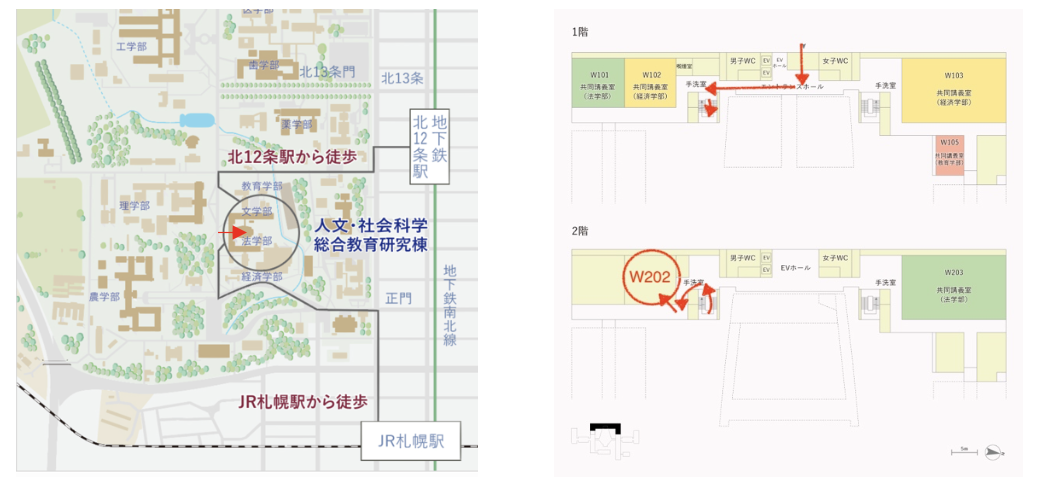- 2024/2/9
- イベント
Hokkaido Philosophy Workshop in Contemporary Philosophy (3/1)
A marked feature of contemporary philosophy is its increasing specialisation. Specialisation within philosophy has undoubtedly led to sophisticated arguments and analyses, but it can also create siloed conversations and communication barriers. In this workshop, we’ll break down these walls by bringing together five speakers exploring diverse topics across various sub-areas of philosophy. Philosophical breakthroughs often happen at the intersections of ideas. Let’s explore the interconnectedness of philosophical inquiry and see where unexpected collaborations and new possibilities may arise!
Date & Time: 13:30-18:00, March 1, 2024
Language: English
Format: In-person
Venue: W202, Humanities and Social Sciences Classroom Building, Hokkaido University.(人文・社会科学総合教育研究棟)

Timetable
13:30-14:20: Rika Sasaki (University of Tokyo) & Masashi Takeshita (Hokkaido University) “Epistemic Injustice and Wrong Advice for Transformative Experience”
14:30-15:40: Dr. L. A. Paul (Yale University) “Value by Acquaintance”
16:00-16:50: Dr. Alessandro Bertinetto (University of Turin) “Performing aesthetic habits in artistic practices”
17:00-18:00: Dr. Patrick Grüneberg (Kanazawa University)
“Rehabilitation as an improvisational practice: using habits for empowerment”
Abstracts
Rika Sasaki (University of Tokyo) & Masashi Takeshita (Hokkaido University) “Epistemic Injustice and Wrong Advice for Transformative Experience”
Some transformative experiences, such as parenthood/childrearing and sexual experiences, are socially valued. These positively valued transformative experiences are sometimes advised by the majority who have had the experience to minorities who have not. This presentation argues that such advice is prima facie morally wrong. In the first half of our presentation, we explain transformative experiences and the norm of advice. In the second half of this presentation, we focus on epistemic injustice, specifically the testimonial injustice and the silencing of the minority by the majority. We discuss advising majority transformative experiences where the testimonial injustice and silencing violate the norm of advice. Therefore, there is a reason to avoid advice transformative majority experiences because they fail to provide good reasons for the advisee.
L.A. Paul “Value by Acquaintance”
I argue that the distinctive relationship between knowledge-that and knowledge-how, recognized by anti- intellectualists and intellectualists alike, implies an analogously distinctive relationship between knowing that something has value and knowing how it has value. I then show how recognizing the importance of expertise in knowing how to value, as viewed through a computational lens, gives us a richer perspective on reasoning and decision.
Alessandro Bertinetto (University of Turin) “Performing aesthetic habits in artistic practices”
Contrary to what one might think, habits play a crucial role in the aesthetic and artistic experience. They shape the aesthetic self and also acquire normative value: they educate people’s taste, on which aesthetic judgment is exercised. This is also true in the realm of artistic creativity. Focusing specifically on the performing arts, where the appreciator witnesses the creative endeavor of artists (musicians, dancers, actors, performance artists), I will argue for the critical importance of aesthetic habits in the articulation of an artistic practice. Certainly, as in the case of certain avant-garde or improvisational practices, part of the aesthetic merit of a performance may lie in highlighting the habits (perceptual, behavioral, imaginative) that constrain and limit creative behavior and, perhaps, in challenging them. However, it does not seem possible to dispense with all habits, and to welcome a novelty that deviates from the ordinary seems to require a propensity of a habitual nature. Indeed, the performative transformation of habits seems to be based on the habitual exercise of technical and aesthetic skills and to become a form of life.
Patrick Grüneberg (Kanazawa University) “Rehabilitation as an improvisational practice: using habits for empowerment”
Contrary to the idea that habits limit self-controlled action, I argue that habitual patterns of bodily movement provide efficacious means to regaining and sustaining agency. Drawing on the phenomenology of gait initiation and referent control, gait rehabilitation can be identified as an improvisational practice. During robot-assisted gait rehabilitation patients make abductive use of their impaired ability to initiate gait, the support of the robot, and intentional efforts to perform gait initiation.
Organized by Centre for Human Nature, Artificial Intelligence, and Neuroscience (CHAIN), Hokkaido University. Inquiries to Katsunori Miyahara (kmiyahara@chain.hokudai.ac.jp).